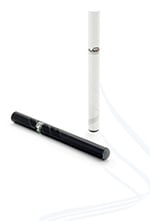Jon Bunte started smoking when he turned 18, a habit picked up from a friend that appeared to ease his chronic headaches.
He continued to smoke when he joined the Air Force, but about midway through his first enlistment, searching for a less dirty way to satisfy his nicotine cravings, he tried an electronic cigarette, or e-cig. Even though experience was wholly unsatisfying, sending him scrambling for a pack of Marlboro Menthol Lights, he tried again this past March, for the same reason.
And according to Bunte, he hasn't smoked a tobacco cigarette since.
"Smoking was affecting my health. It made running difficult, and waking up coughing up phlegm is no way to start a day. ... Vaping gives you all of the effects of smoking without the nasty bad ones," Bunte says.
Once a curiosity at mall kiosks, e-cigs are popping up on tobacco shelves, in smoke shops and at military exchanges, which began carrying the battery-powered devices within the past two months. Since May, sales of e-cigs in the Army and Air Force exchanges alone topped 28,600.

Celebrities such as Leonardo DiCaprio and Lindsay Lohan have been spotted vaporizing, or "vaping," in Los Angeles, and major tobacco companies like R.J. Reynolds and Lorillard have waded into the market.
But as e-cigs grow in popularity, government regulators and the military services are sorting out what rules should apply to these accessories, which turn a nicotine-infused liquid like propylene glycol or vegetable glycerine into an inhalable vapor.
The Food and Drug Administration has yet to impose rules on e-cigs but has said it likely will add them to the list of tobacco products regulated by the agency sometime this year.
The military services already treat them as if they are tobacco products, restricting their use to designated smoking areas.
Among the concerns the FDA has about the gadgets are long-term health consequences, quality-control issues and marketing, especially questions over whether children and teens may be drawn to them. The e-cigs are available not only in tobacco and menthol flavors but in popcorn, chocolate, caramel machiatto and one of Bunte's favorites, strawberry vanilla cupcake.
Vapers and manufacturers say they are much safer than cigarettes, but no studies have been done on their long-term health effects, mainly because they're relatively new to the market.
A German study published in late June found that some liquids used in e-cig cartridges contain volatile organic compounds, acetone, formaldehyde and other chemicals. The German Cancer Research Center in Heidelberg also found that they produce secondhand vapors that may affect nonusers.
Still, users say they feel better after having switched from traditional cigarettes to electronic ones.
Bunte, for example, says his teeth are cleaner, he sleeps more soundly and no longer wheezes or coughs during exercise.
"They aren't branded as a [smoking cessation tool], but I feel they are a great tool for it," Bunte says.
In the coming months, consumers will have more choices for vaping as the large tobacco companies jump into the e-cig market. Altria, maker of Marlboro, will launch MarkTen this summer in Indiana in preparation for a national rollout.
Lorillard, which manufactures Newport and Kent cigarettes, purchased Blu Ecigs in 2012 and has been expanding its availability at retail stores.
And this month, R.J. Reynolds, maker of Winston and Pall Mall cigarettes, will introduce its Vuse e-cigarette in Colorado, also eyeing a national expansion.
Company believe their U.S.-made e-cig will be an industry game-changer, offering such a consistent experience that smokers who try one will continue using it.
"In studying the market, there is high trial of electronic cigarettes but low adoption. There have been quality-control issues. These are things we wanted to address," says Richard Smith, communications manager for Reynolds American.
Bunte says smokers often don't stick with e-cigs because they try inexpensive disposable brands that often don't deliver consistent vapor or smoking experience.
Only time and research will tell what the long-term health effects of vaping are, but the devices appear to be here for the long haul. According to some estimates, the market could top $1 billion in sales in the coming years, and the social stigma of smoking appears to be influencing smokers to find alternatives.
"No yellowed teeth, no disgusting smells on me, no accidental cigarette burns in the car. It basically removes all of the negative effects of smoking," Bunte says.
Patricia Kime is the health reporter for Military Times. She can be reached at pkime@militarytimes.com.





